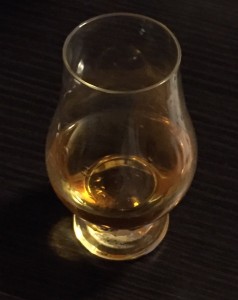 Whisky doesn’t have bubbles. Beer has them, so does champagne. Whisky doesn’t. It just sits there in the glass, unassuming. It looks like apple juice. A sharp nose can sense that it’s actually whisky. Fruit flies know the difference, although sometimes they don’t care. They end up in the glass anyway. As the joke goes you’re supposed to fish them from the dram and exclaim, “Spit it out, you!”
Whisky doesn’t have bubbles. Beer has them, so does champagne. Whisky doesn’t. It just sits there in the glass, unassuming. It looks like apple juice. A sharp nose can sense that it’s actually whisky. Fruit flies know the difference, although sometimes they don’t care. They end up in the glass anyway. As the joke goes you’re supposed to fish them from the dram and exclaim, “Spit it out, you!”
The smell of the whisky reveals its origin, its age, its source materials. Is it corn, rye, barley, wheat, or something else? The nose will tell you. Is it from the Spey, the Highlands, the Lowlands, the islands, or the Orient? You can’t hide the smell of peat, the sweetness of the glen, the salt, the heather, or the rain. Did the angels soften what heads remained? How much time did they have to soften them? Smell it. All the answers are there in the smell.
The barrels are in the taste. Bourbon’s sugar and hints of corn rub off on most. Fine oaks turned out to be not so fine enough to stay popular. Sherrys and reds are the highlights of the day, finishing many a batch. The malts taste fine in their homoganie. The color, as meaningless as it is, looks as honey in the light. Blame the wine, also, for that.
Fanciful thoughts would credit the still for the finish, and why not. The tasters spend enough time discerning the heads, hearts and tails from the contraptions that there ought to be some contribution to the flavor. There’s a romantic mystery hiding in the still. Aging copper, shapes, sizes and imperfections may all leave subtle marks on water of life. How does it tickle the tongue? Where does the fire start down the throat? How warm does it make the belly?
In every dram of whisky is the story of water and grain transforming into smells, tastes and sensations. Yet it’s an unassuming liquid that doesn’t doesn’t make a lot of fuss. It just sits there in the glass, without bubbles.



 I was reading a post over at Tynan.com about sticking to your habits. At the top of the post was a photo of Tynan’s RV. The habit he was trying to stick to was keeping his home tidy.
I was reading a post over at Tynan.com about sticking to your habits. At the top of the post was a photo of Tynan’s RV. The habit he was trying to stick to was keeping his home tidy.

